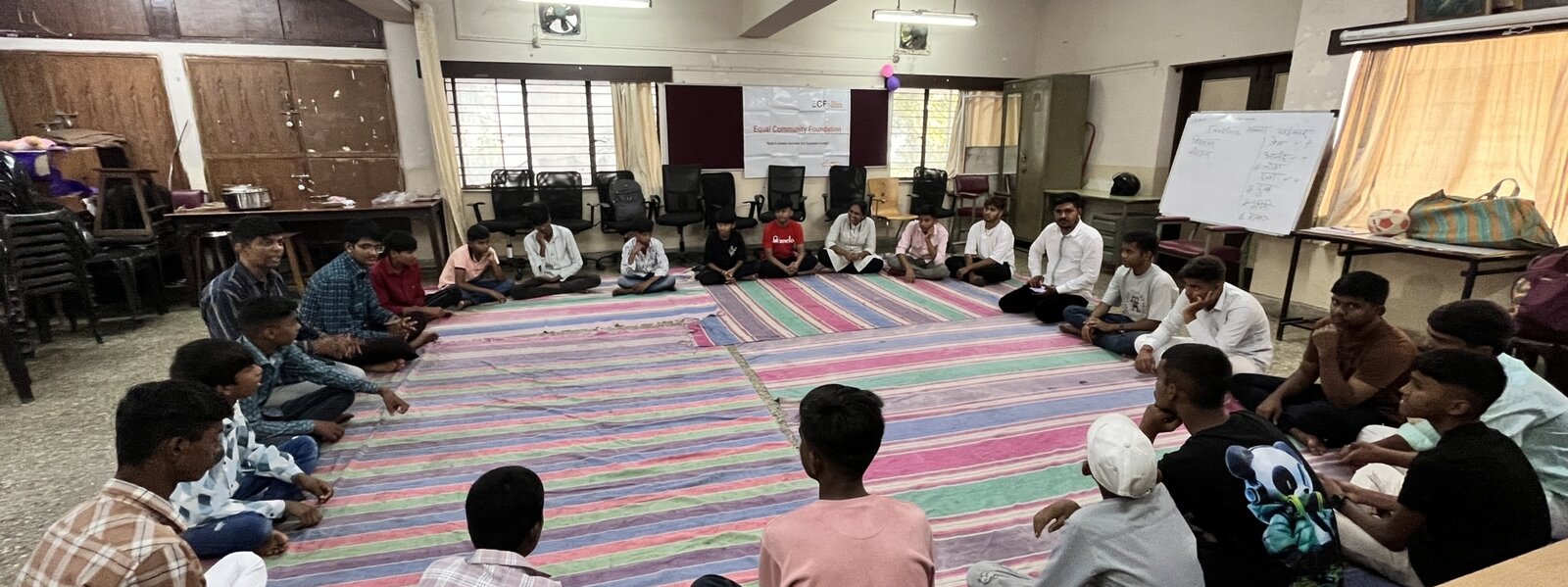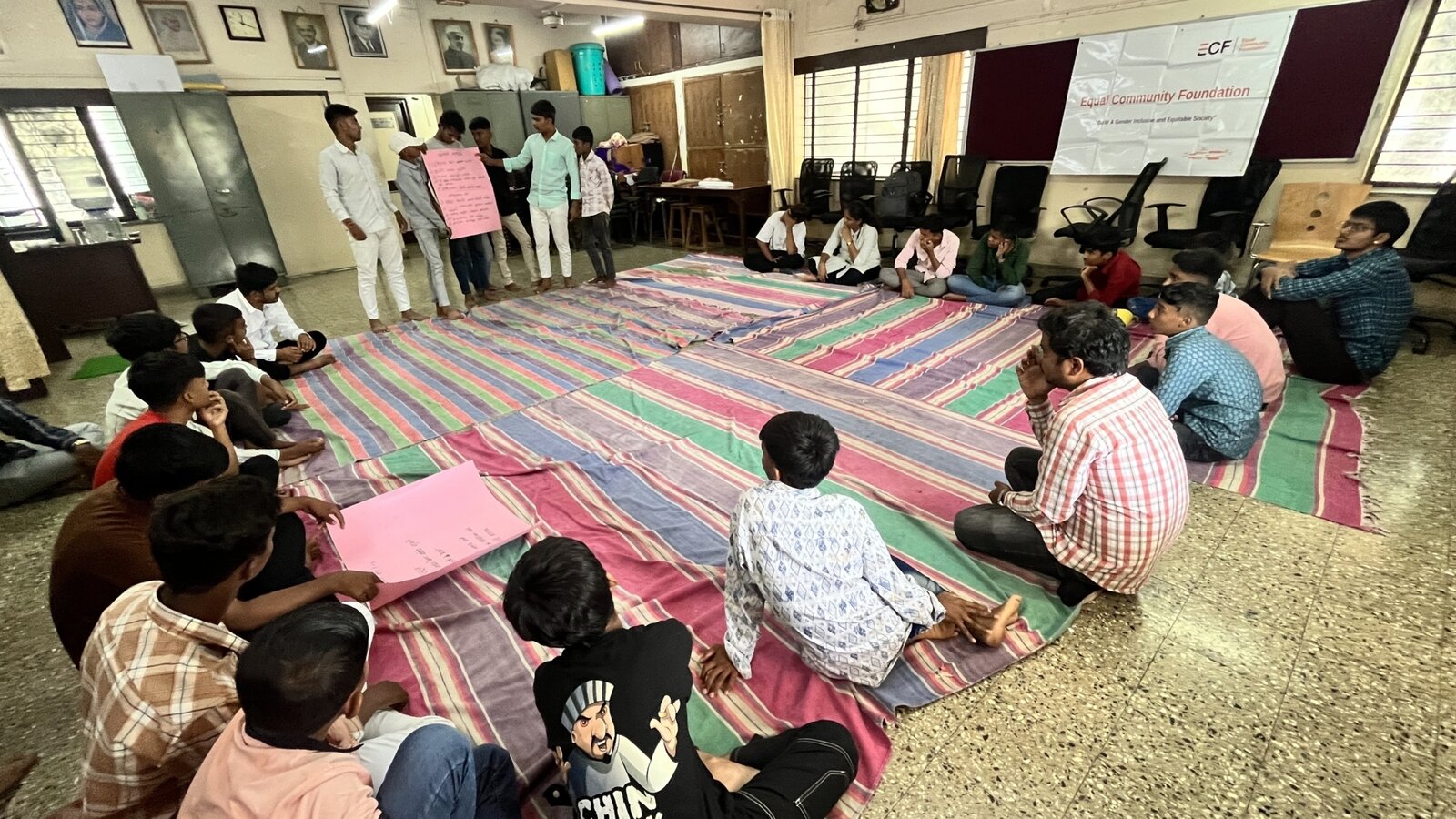How rigid ideas of masculinity are hurting boys’ mental health — and what we can do about it

- Published On
- 2 Jul 2025
- Published By
- Equal Community Foundation
- Reading Time
- 7 minutes
- Resource Type
- Op-ed
Equal Community Foundation (ECF), a member of MenEngage India, believes that when boys are given the space to question, reflect, and express without judgement, it leads to deeper emotional wellbeing and stronger, more equal communities. This blog by Urasmita Ghosh, Communications Associate at ECF, is a call to action to listen more, to care more, and to reimagine strength not as silence, but as authenticity and connection.
June is widely recognised as Men’s Mental Health Month. But recognition must not stop at a date on the calendar. It must translate into real, ongoing conversations. Conversations that dig deep, challenge long-standing assumptions, and make space for all parts of a young man’s identity to exist without shame.
At Equal Community Foundation (ECF), our decade-long work with boys and young men has shown that mental health and emotional wellbeing are deeply connected to societal expectations of both what boys are told to be, and what they are denied the space to become.
From a young age, boys are shaped by a narrow set of expectations. Be strong. Do not cry. Look tough. Win. Provide. Protect. Stay in control. Do not show fear. Do not ask for help. Always have the answers. Never show doubt. Push through, no matter what. These rigid norms, deeply ingrained in our culture, reduce boys and men to performances of strength. But at what cost?
And these expectations are not abstract; they show up in daily life, in school corridors, on playgrounds, at home.
These norms do more than restrict boys, they also contribute to harmful patterns of inequality, domination, and silence that affect everyone. Unpacking these expectations allows boys to experience emotional freedom and develop healthier relationships. It also takes a vital step toward ending gender based violence and building a society rooted in equality, care, and mutual respect.
We have spoken with adolescents who suppress grief and isolate themselves because vulnerability is seen as weakness. We have seen adolescents withdraw from creative pursuits they once loved — dancing, painting, storytelling — because they were labelled “unmanly.” We have heard young men laugh nervously when asked about stress, anxiety or fear. Often, they have never been asked these questions at all.
“When my teacher asked only girls to make rangoli, I said boys should be included too. We participated, and it felt great to challenge stereotypes.”
– AfE Participant, (Action for Equality, Our Gender Transformative Programme)
Sometimes, we meet a boy who shares how writing helps him process his feelings, something he had kept hidden for years because “boys do not write about feelings.”
Society rarely allows boys the space to say: “I feel anxious about not being enough.” or “I want to pursue writing or fashion design, but I do not know if I will be accepted.” or “I like being in the kitchen. Why is that strange?”
And yet, these are the very voices we must listen to if we want to build a society that supports mental wellbeing for all genders.
Safe Spaces: The Why and How
At ECF, our Gender Transformative Programmes have consistently focused on creating safe spaces – spaces where boys can reflect, question, and unlearn harmful norms without fear of ridicule. These are spaces where a boy who has never talked about his parents’ pressure can finally speak up. Where a young mind questions why his friend was mocked for crying. Where our mentors, trained from the community itself, help guide conversations around body image, performance anxiety, gender roles, and aspirations that extend beyond the stereotypical.
“Men’s mental health needs more open spaces, free of judgement, where boys and men feel heard, respected, and accepted. Our sessions focus on listening deeply, allowing boys to speak beyond traditional norms and societal expectations.” In these sessions, boys do not just learn about gender equality — they experience what it feels like to be heard — and that experience can be transformational. “It is crucial to have spaces where boys and men, like all genders, feel equally valued and heard.”
– Pravin Katke, Programme Manager, ECF
These spaces do more than offer boys a chance to speak; they help cultivate empathy, responsibility, and awareness of others’ realities. When boys begin to understand how gendered expectations shape everyone’s lives, they are more likely to question inequality when they see it and act in ways that affirm respect, care, and justice in their relationships. What begins as personal growth can gradually lead to social consciousness and everyday acts of allyship.
We have also seen the power of peer conversations – where one boy opening up about anxiety encourages another to talk about the pressure he feels to meet expectations at school or home. In our work across schools, colleges, and communities, peer support becomes a quiet revolution, slowly chipping away at silence.
It is time we question the beliefs that silently harm boys’ mental health. Boys are often raised in environments where emotional distance is mistaken for resilience. From an early age, they are conditioned to toughen up, to stay quiet, to not cry. But bottling up pain does not build strength; it chips away at well-being. Cooking or caregiving is not all about masculinity or femininity — nurturing is simply human. And seeking help is not weakness; it is strength. It is how we survive, grow, and support one another.

Looking Beyond the Checklist
Still, many boys silently navigate a world where their real emotions remain unacknowledged. There is a mental checklist boys grow up with – to earn well, look strong, stay silent, lead always. But what about nurturing relationships? What about self-expression? What about pausing to reflect or choosing a different life path – one in music, art, caregiving, social impact?
Why is it still difficult for a teenage boy to say, “I am struggling,” without fearing judgment?
It is this gap between what is expected and what is needed that leads to crisis. Untreated anxiety, unspoken trauma, and performative masculinity pile up. Over time, the burden becomes invisible, but unbearable too.
Over the last decade, ECF has worked with thousands of boys, youth leaders, and alumni. We have heard them speak of the freedom they felt after being able to share their thoughts, feelings or doubts. We have watched them encourage peers to listen, care, and challenge toxic beliefs. Many of them now share how they feel more at ease having honest conversations with their female friends — and how those friends, in turn, feel safer and more comfortable around them.
What starts as personal reflection often ripples outward — changing how boys relate to friends, siblings, and even future generations. We have seen mental wellbeing improve not because of one-off sessions, but because of sustained engagement, trust, and belief in their ability to change and lead.
“I used to spend a lot of time outside, but now I balance my time at home, helping with the family business, and spending more time with my father.”
– AfE Participant, (Action for Equality, Our Gender Transformative Programme)
This shift is not just about presence. It is about building connection, responsibility, and shared understanding within the family.
“I now wake up early, organise the house, fetch water, and fold clothes independently. Taking responsibility at home feels good.”
– AfE Participant, (Action for Equality, Our Gender Transformative Programme)
Voices like this remind us that healing starts when we stop performing and start feeling.
And we keep learning from them. Change does not come from giving boys new roles to play. It comes from letting them let go of the ones that hold them back.
Men’s Mental Health Month reminds us to pause, listen with intention, ask the tougher questions, and create systems that care especially for those who have been taught to stay silent. Boys carry fears, doubts, and dreams too.
When boys grow up with emotional safety and the freedom to express themselves, it nurtures self-awareness while also influencing how they engage with the people in their lives. These shifts ripple outward, influencing how they treat peers, partners, and future families. This is essential not only for mental health, but for gender justice. The transformation of boys’ emotional wellbeing is deeply connected to the prevention of gender based violence and the advancement of rights for women, girls, and people of all genders.
To create emotionally safe spaces for boys is not separate from the work of justice and equality, it is one of its essential foundations. When boys are encouraged to unlearn harmful norms and build empathy, they become less likely to enact dominance, control, or violence in their relationships. Though it begins with boys, this change plays a critical role in shaping safer, more inclusive communities for women, girls, and people of diverse genders. Supporting boys in this way is a driven step toward breaking systems of power and control that enable gender based violence to persist. So what might change if every boy felt safe to simply be himself? What if expressing emotions was seen as strength, not shame?
Because every time we normalise care, vulnerability, and expression, we move closer to a world that supports everyone, not just some. If this makes you think, don’t stop there. Share the thoughts. Start the conversation. Create the space.
Because mental health is not a men’s issue. It’s a societal one. And it is time we all showed up.
At Equal Community Foundation, we do not directly provide clinical mental health services. But we know that mental wellbeing is shaped by the spaces we occupy, the roles we are allowed to question, and the relationships we build. Through our gender transformative programmes, we engage adolescent boys in reflective conversations, encourage self-awareness, and promote emotional honesty whether through sessions, community activities, or everyday dialogue.
“Men’s mental health is a crucial part of any social construct. There are so many roles we are expected to play, often with provider or guidance but little emotional space. Somewhere, we begin to ignore our own needs and feelings because of societal expectations. The pressure to conform to ‘become’ something that fits a so-called masculine ideal can be overwhelming. It passes on, too. If a father suppresses his emotions to meet these norms, the son often grows up doing the same. It becomes a cycle. Sometimes, we just need to pause and ask: What do I actually feel? Not what I am supposed to feel, or do, as per society. That reflection, I believe, is necessary.”
— Kshitij, Youth Advocate & Consultant
Mental health is not a narrow domain, rather it is a wide spectrum. And through our work, we aim to hold space for boys to explore who they are, build healthy connections, express freely, and grow into empathetic individuals.
Promoting boys’ emotional wellbeing is not separate from the fight for gender equality, it is part of it. When boys are supported to care, listen, and express, it challenges the roots of gender-based violence and opens pathways for more equitable, caring societies. Rights for women, girls, and people of diverse genders flourish in spaces where boys are not taught to dominate, but to understand and connect.
This is not a side note, it is central to reshaping the norms that define their lives.
Author: Urasmita Ghosh, Communications Associate, Equal Community Foundation
Photo courtesy: Ashish Bhagwat, Programme Mentor, Equal Community Foundation.
Visit Equal Community Foundation (ECF)’s website for more details: www.ecf.org.in

